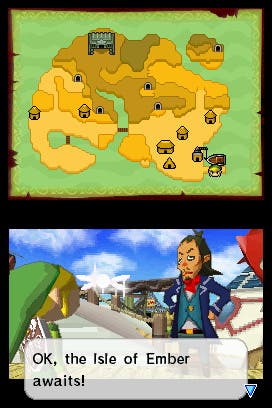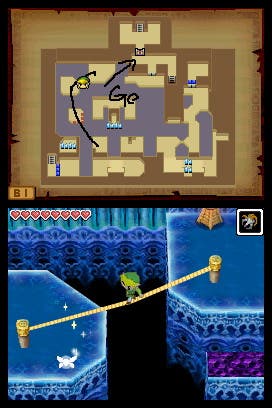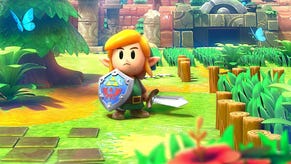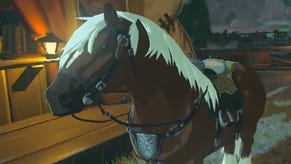The Legend of Zelda: Phantom Hourglass
About time.
If you've already slogged your way through Wind Waker and Twilight Princess, you might imagine that you've seen enough bombs, boomerangs, bows and hookshots to last a lifetime. Well, you haven't, so sit down and stop sulking.
Nintendo adventures, and Zelda games in particular, are always very precise tangles, designed to be navigated in a certain way. It's that precision more than anything that excites our gaming senses. When it all comes together, and the jingle plays, it's hard not to smile to yourself. If Phantom Hourglass is the cleverest yet, and I think it probably is, it's because it does so much to convince you it's gone beyond that, even though it's basically the same old idea.
It feels like you're adventuring. You're marking charts. You're picking up clues. When you realise how to startle a big-eared enemy, or you work out how to transfer a symbol from the top screen to the bottom, you didn't really do much to figure it out, but the illusion is impeccable, and drives you onward to the next.
Phantom Hourglass doesn't just remake Zelda's controls to fit the DS, it remakes Zelda to fit the DS. The basics - pointing the stylus in the direction you want Link to go, jabbing and slashing to attack, and prodding the point on the screen you want a thrown bomb to land - are well known (and the simple elegance with which Nintendo wields the DS' many "things" ought to be a lesson to other developers), but the way they're applied across the game world to solve puzzles is enthralling in charmingly new ways.
Even the most obvious revisions - like realising you can activate a switch around the corner by drawing a line for your boomerang to travel along, or blowing into the microphone to put out candles - will sweep you up. As you wander around the game's dungeons - the usual, multi-storey death-traps - looking for clues, dodging flames and seeking out keys, you will find the experience more enjoyable on their account. But they're the thin end.
Take the map (and if you're making an action adventure game on the DS from now on, you probably will). By the simple act of drawing on it, you can always keep track of what you have and haven't done, the order you're meant to pull switches, or what kind of key you need. When you're not annotating the map, it sits on the top screen, reminding you where you're going.

It's not all "1, 2, 3, 4, I deserve an open door", either. One puzzle involves drawing lines between four tablets to find a hole in the ground where they intersect. This being a direct sequel to Wind Waker (it doesn't matter if you haven't played it), you also do a lot of sailing between islands, and in order to overcome one hurdle you have to hunt down a lost map to chart a path through hidden obstacles. Having to actually copy this onto your charts by hand automatically makes this the best pirate game ever.
In total there are six main dungeons, and each is as alive with new ideas and "Zelda moments" as the last. You've done a certain amount of it before, but it always plays so nicely with the bits you haven't. By the time you get to the boss that asks you to combine third- and second-person perspectives to unlock its weakness, you won't be able to stop until the end.
Rounding things out, and drawing the story together, is a seventh construction, the Temple of the Ocean King, which you revisit at intervals to probe further, and this is where the Phantom Hourglass itself comes into use. Literally an hourglass, it protects you from the poisonous atmosphere for as long as there's sand in the top, before it needs to go outside and see the sun again to recharge. While the timer ticks down, you have to navigate corridors patrolled by rock-hard phantom knights, using safe zones to stop the clock and escape their murderous gaze, while solving puzzles to make further progress.
The Temple of the Ocean King is the most divisive bit of the game, largely on account of the necessary repetition, which feels out of place. New equipment allows you to take shortcuts, but not enough. Every other dungeon opens a portal back to the start before you reach the boss chamber. Why couldn't this one do something similar before you reach each objective?
There are other question marks, but they are few, and they carry less weight against the whole. Sailing still takes a while, but is simpler than it was in Wind Waker, and offers you more of a chance to explore, seeking out uncharted islands, and using the salvage arm to play the UFO Catcher mini-game for sunken goodies (and at better odds).

A bigger problem, arguably, is the game's maddening reluctance to let you figure things out for yourself. The clues are too bold (and highlighted), and the fairy on your stylus tip is too helpful. The illusion of adventure is seldom threatened, thankfully, and the alternative is quite possibly unreasonable frustration, but the balance struck is perhaps too close to prompting - and too often when you don't need help, and the lack of it would make the solution sweeter.
Forgiving these flaws is easy, though, and not just because everything is such a lovely riddle to solve, but because it's all framed so magnificently, harnessing the already lovely Wind Waker artwork with more charm and humour than anything else in Zelda's canon. When Link opens a chest and realises it's empty; when your sailor pal hides in a basket; when a new fairy friend dances around you, it's a cure for even the harshest grumps. When you recover a diary meant for a captain's son, undiscovered yards from his home, and realise he will never be the man his dad hoped he'd become, it's even poignant.
When it's over, you're left to turn to a surprisingly engaging throwaway multiplayer game, where one player tries to collect force gems and the other plots the path for roaming phantoms. You can play this over the Internet or locally, and it even links back to the story mode with its prizes. You could argue, if you wanted to, that it makes up for the main quest's briefness - a trifle at less than 20 hours. But in practise you don't really have to.
Even among Nintendo's best, Zelda games have a unique ability to capture the imagination in ways that you'll lie in bed and think about, echoing themselves without becoming repetitive, and while this one might be over sooner than you expect, you won't forget it in a hurry, and you won't be left wishing that it lasted longer, but rather that more games were as well attuned to their host console's abilities, and so completely magical. Simply one of the DS' best.





